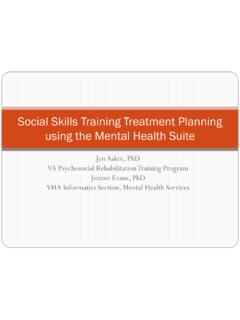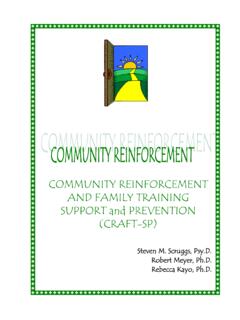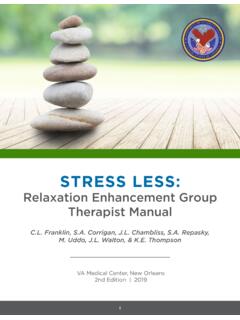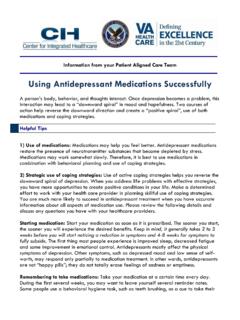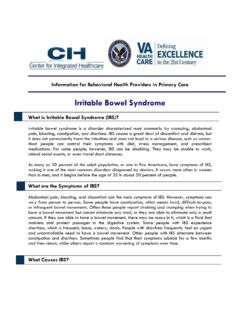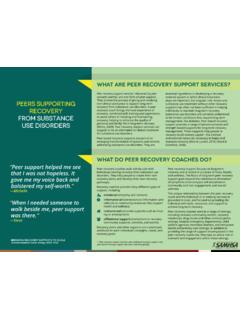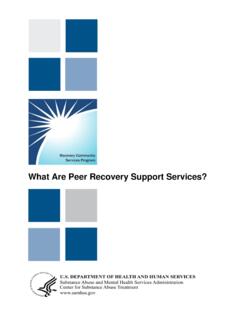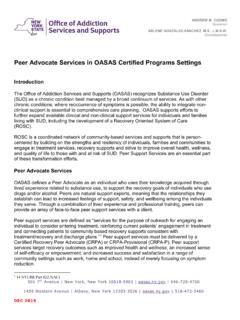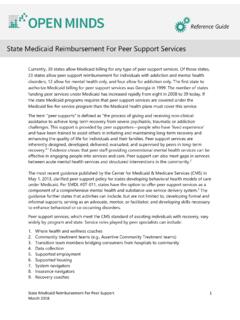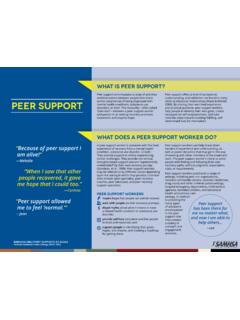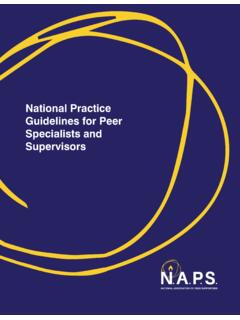Transcription of Peer Specialist Toolkit - Implementing Peer Support ...
1 peer Specialist Toolkit Implementing peer Support services in VHA This document is a collaborative project between the VISN 1 New England MIRECC peer Education Center, and the VISN 4 MIRECC peer Resource Center. Contributing authors: Matt hew Chinman, Kevin Henze, and Pat ricia Sweeney. Edited by Sha ron McCarthy page 3 Acknowledgements We thank Dan O Brien-Mazza, National Director, peer Support services ,Psychosocial Rehabilitation and Recovery services , Mental Health services . Dan has fully supported this project, and given expert help with many details in this document. We thank members of the VISN 4 peer Resource Center Advisory Committee: Sara Chapman, Lisa Fitzsimmons, Diana Hoke, and Steve Stanley, who reviewed several versions of this document and made thoughtful contributions. Sara also provided extremely helpful technical Support and guidance in developing the Toolkit . We thank Erin Klugh, Visual Information Specialist at VAPHS, who provided us with the graphic design layout in a timely and helpful way.
2 We thank Mala Shah, VISN 4 MIRECC Research Associate, for her gracious help with technical editing on several versions. We especially thank all those peers who are working everyday in the VHA, for their pioneering efforts to provide an essential Support for Veterans across the country. Some of the content in this Toolkit was developed with Support from two VA Health services Research & Development grants, PEers Enhancing Recovery (IIR 06-227) and Improving Care of Veterans by Using Consumers as Mental Health Providers (IIR 02-009-1). Table of Contents 1. Who are peer specialists and what do they do? 3 2. What does the research say about peer Support ? 5 3. Why should we hire peer specialists ? 7 4. What are some common misperceptions about peer Support providers? 9 5. How do I build Support for peer specialists and integrate them onto my team? 11 Stage 1: Exposure Tips Stage 2: Adoption Tips Stage 3: Implementation Tips Stage 4: Practice Tips 6.
3 Technical details of hiring peer specialists in VHA 21 7. What about training for peer specialists ? 23 8. What should I know about supervision of peer specialists ? 27 9. Where can I go for additional help? 33 10. References 35 11. Appendices 37 page 2 1 Who are P eer specialists and what do they do? peer Support occurs when people with the same types of problems help each other. There are different kinds of peer Support , including peer Support groups, organizations, and providers. peer specialists (PSs) and peer Support Technicians (PSTs): In VHA, PSs are VA employees who help Veterans with serious mental illnesses and substance use disorders to successfully engage in their treatment. The peer Specialist is the newest of the two classifications for peer Support providers employed in VA , but the competencies expected of PSTs are the same.
4 Therefore, for the sake of simplicity we will use the term, peer Specialist or PS, throughout the rest of this Toolkit . peer specialists promote recovery by sharing their own recovery stories, providing encouragement, instilling a sense of hope, and teaching skills to Veterans. These services are provided by an appropriately qualified, VA-employed peer Specialist . In VHA, PSs have defined competencies and are trained to use their liv ed expe riences to help Veterans identify and achieve specific life goals related to recovery. The complete list of expected competencies can be found in Appendix 1 in the Department of V eterans Affairs peer Specialist Training Manual. The training manual can be found on the VHA Office of Mental Health services peer Support services SharePoint: A helpful tri-fold brochure is available to introduce the role of VA peer Support providers entitled, Understanding peer Support services in Veterans Health Administration (VHA).
5 This brochure is available for download and printing on the peer Support services SharePoint noted above. page 3 What do peer Support Providers do? DO DON T DO Facilitate peer Support groups Share their own recovery stories Advocate for Veteran consumers Act as role models of recovery Provide crisis Support Communicate with clinical staff Act as a liaison between staff and Veterans Work on a variety of clinical teams Provide outreach & educate VA facility staff and Veterans about peer Support services Provide psychotherapy Do other people s jobs or fulfill other people s roles in the facility Collude with Veteran consumers against clinical staff Cross boundaries Support Veteran consumers in their self-destructive or illegal behaviors Criticize clinical staff in front of Veteran consumers page 4 2 What does the research say about peer Support ?
6 peer Support Research Outcomes In the past, studies that are more descriptive showed that peer Support providers were often better able to: Empathize Access social services Respond to clients' strengths and desires Be tolerant, flexible, patient, and persistent peer Support was recognized by Centers for Medicare and Medicaid services as an evidence- based practice in 2007 Over 20 states have Medicaid reimbursement for peer Support services . The first VA study, called the peer Study, looked at peer Support Technicians and found PSTs influenced Veterans involvement in their own care and increased their social relationships (Chinman et al., under review). There are 14 studies of peer Support providers in non-VA clinical settings. Eight of these studies showed some positive benefit to clients of peer Support , including: BENEFIT STUDY Less inpatient use Clarke et al., 2000; Klein et al., 1998; Min et al.
7 , 2007; Landers & Zhou, 2009 More time and engagement with the community Clarke et al., 2000; Min et al., 2007 Better treatment engagement Craig et al., 2004; Sells et al., 2006; Felton et al., 1995 Greater satisfaction with life Felton et al., 1995 Greater quality of life Klein et al., 1998 Greater hopefulness Cook et al., 2010 Better social functioning Klein et al., 1998 Fewer problems and needs Craig et al., 2004; Felton et al., 1995 page 5 Research also shows some challenges, both in and out of VHA: Role confusion: Lack of clarity about peer Support providers duties Staff resistance: Less supervision and Support Exclusion from treatment team meetings Unequal treatment: Encouraged to volunteer for peer Support roles rather than have paid position Lack of a viable career path Lack of access to medical records Relegated to grunt work Questioning reasonable accommodations and scrutiny of sick leave This Toolkit will address these challenges and provide strategies for preventing many of these challenges from occurring.
8 Page 6 3 Why should we hire peer specialists ? Improved Outcomes for Veterans peer Support provides a wide variety of improved outcomes for Veterans. Research and experience have shown how peer Support providers c an improve problems at the client level, and problems related to the overall treatment system. Below are examples of how peer Support helps Veterans diagnosed with serious mental illnesses. How peer Support Addresses Client and Treatment System Factors: Factors that contribute to poor outcomes for those with serious mental illnesses (SMI) Client Factors Treatment System Factors Social isolation Disconnection with ongoing outpatient treatment Powerlessness & demoralization regarding illness Overburdened providers Fragmented services Lack emphasis on recovery, rehabilitation, empowerment peer Support services address each of the factors: Enhances social networks by role modeling facilitating peer Support activities Engages clients; makes tr eatment more relevant through collaboration Activates clients; teaches coping & street smarts; provides hope through role modeling Supplements existing treatment.
9 Increases access Provides case management/ system navigation to increase access Emphasizes recovery: acts as liaison between consumer and system focuses on meaningful life roles and community reintegration (Adapted from: Toward the Implementation of mental health consumer provider services , Chinman et al. 2006) page 7 peer specialists are required as part of VHA System Transformation In 2003, the President s New Fre edom Commission on Mental Health Report recommended using consumer providers, s tating, "Because of their experiences, consumer providers bring different attitudes, motivations, insights, and behavioral qualities to t he treatment encounter (p. 45)." VHA now requires the use of peer Support pro viders within mental health . Several regulations, guides, and laws describe how peer Support providers are to be included in VHA programs.
10 All these handbooks are found at These include: VHA Handbook , Uniform Mental Health services in VA Medical Centers and Clinics (2008) mandates the availability of peer Support providers: peer Support is one of the 10 fundamental components of recovery according to the National Consensus Statement on Mental Health Recovery (p. 4). All Veterans with SMI must have access to peer Support services , either on-site or within the community (p. 28). Staffing models for VHA recovery programs stipulate including peer Support providers: VHA Handbook Mental Health Residential Rehabilitation Programs states, Programs must engage the Veteran in peer Support while enrolled in the program and encourage the extension of peer Support to outpatient care following discharge (p. 38). VHA Handbook Psychosocial Rehabilitation and Recovery Centers (PRRC) states, All facilities must design peer Support services for the treatment of Veterans with SMI including those with co-occurring disorders.
